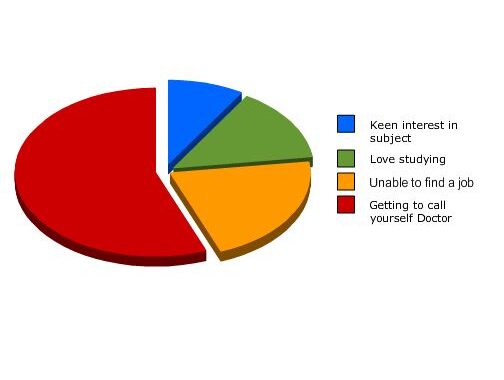Are you thinking about pursuing a PhD? Do you have a solid reason on why you want to enrol in a doctorate course? Is it necessary to get a PhD to be successful in your career? As a future PhD student, these would probably be some of the very few but significant questions that might pop up in your mind.
It’s equally important to ask yourself, WHY do you want to pursue a PhD in the first place? There are tons of reasons that would require you to take some time off to really reflect on your ultimate decision to go ahead and bear the title ‘Dr’ and must be attempted for the right reasons.
Recently, Facebook user Risidaxshinni Kumarusamy took to her social media platform to share her insights on the DO’s and DONT’s of pursuing a PhD. Obtaining a PhD is never easy, but it’s fair to say that Risi has explained it well to those seeking to pursue the prestigious programme, the highest academic qualification one can attain in a lifetime.
Reasons NOT to do a PhD:
- Because you (or your family) want a ‘Dr’ in front of your name. Asians in general (and Malaysians in particular) have assigned an unnecessarily high status to the title ‘Dr’ – medical or otherwise. Societal pressure and deeply rooted cultural dogma have also instilled that a higher education level somehow reflects prestige or worth. Guess what? Having a ‘Dr’ title does not necessarily make one a superior human, and educational qualification is NOT an indicator of knowledge or talent. What about college dropouts who are now successful entrepreneurs? What about degree holders who have 20 over years of industry experience? Do not fall into the trap that a PhD or ‘Dr’ title makes you better or more valuable in your personal/professional life. Not all jobs value/reward a PhD anyway, especially in the corporate sector. Play to your strengths or you will be unfulfilled chasing society’s ideals.
- Because you think lecturing is an easy job. Several people have said to me, “Hey, I want to get a PhD and become a lecturer – it’s easy money.”

- It most certainly is NOT. A career in academia is not to be taken lightly – there is never any downtime! In addition to the heavy workload that comes with lecturing (e.g., preparing and delivering lectures, creating and grading assignments/exams, completing paperwork on student performance, consulting students, etc.), PhD-holder lecturers must also conduct research, publish academic articles, consult on industry projects, perform administrative duties, supervise PhD and Master’s students, act as viva voce/proposal defense examiners, organise and speak at workshops/conferences/seminars, hold faculty leadership posts, and participate in the university’s corporate activities. I have yet to hear of an academician who isn’t working late into the night and on weekends. Still think lecturing is a comfortable job?
- Because you were always a good student, and a PhD would be effortless. Au contraire, a PhD is not for smart people; it’s for persistent people. I learned this the hard way. I was a good student all my life – straight As, awards, scholarships – but being good at taking exams and acing coursework did me no good during my PhD. Doing research and writing a thesis requires tenacity, perseverance, and commitment. It demands the mental strength to do and re-do; to learn, unlearn, and relearn; and to accept and work on criticism, time and time again, for YEARS. Granted, it would be easier if you’re smart, but intelligence is certainly not the most important quality for a doctoral student.
- Because you have a friend/family member whose thesis you can ‘modify’ to make your own. This might sound unusual, but it is a rather common occurrence these days. People pursue an ‘express’ PhD by plagiarising an existing thesis (with small tweaks), which drastically reduces the time and effort required. This is not only unethical but has severe consequences later on when you cannot defend your work or perform your job duties properly.
- Because you want an extended holiday from work and your employer is willing to sponsor your PhD. Yes, it is appealing to take a long (and fully paid) break, be it locally or overseas. But remember, you still have to put in the work for a PhD, which can be just as gruelling as a full-time job. Do not underestimate the time and energy commitment involved, or your ‘holiday’ will not be a very happy one. Moreover, sponsored PhDs often come with certain conditions from your employer (e.g., to finish within 3 years, to serve the organisation for at least 5 years, etc.) – carefully consider if this is what you desire in your career.
Reasons on PURSUING a PhD:
- You’re already in the academic field and a PhD is a natural progression in your career.
- You must conduct study and expertise in your field as part of your work or career.
- If you have a PhD, you are more likely to be promoted or advance in your job.
- You’ve chosen a research topic that is extremely important to society or your field. You may even consider turning your findings into a book or training program for academic, public, or business usage.
- You want to change careers from the corporate world to academia – not because it’s easy, but because it’s a better match for your abilities and interests.

There are a number of reasons why someone would pursue a PhD. From expanding one’s knowledge to personal desire, changing one’s professional path, future employment possibilities, and job market needs. But I did want to point out that no one’s explanation is superior to another. What counts in the end is that you are happy with your decision to pursue a PhD.
If you’re on the fence on whether or not to pursue a PhD, I hope you’ll find this information helpful. Thank you for sharing great insights for our fellow readers, Risi!
Follow us on Instagram, Facebook or Telegram for more updates and breaking news.








